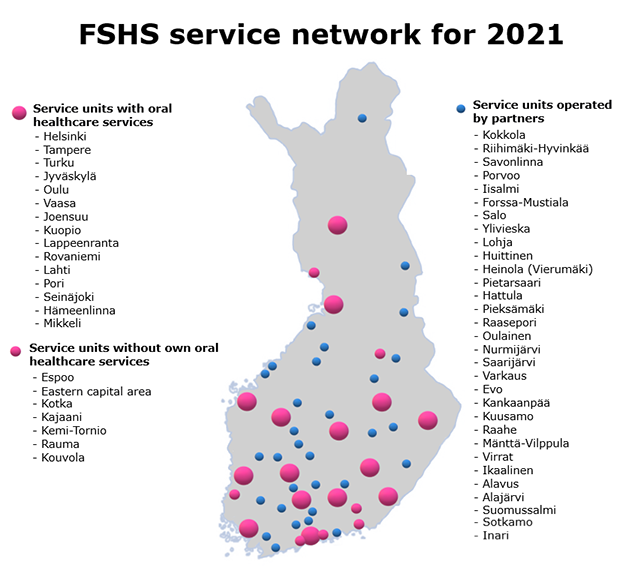The Student Union of the University of Eastern Finland
The Student Union of the University of Eastern Finland
21.02.2020
Services produced by the FSHS will expand to cover all students in higher education starting from 1 January 2021. The FSHS’s own service points will be available in 21 towns and can be used by all students irrespective of their place of study. 31 service points will be operated by FSHS partners in more remote places, which will be available to students, studying in these respectable places. About 5% of students will be within the scope of the service units run by partners.
The key requirements for the service network were accessibility of services and a sufficient customer base at the service units.
The accessibility criteria regarding the use of public transport were defined as follows: travel time of no more than 45 minutes, transport frequency of at least once per hour, and a one-way ticket price of about 7 euros. The criteria for oral health services are 60 minutes, once per two hours and 10 euros. If there are limited oral health services available at the nearest service unit, the travel time to a service unit providing more demanding services must not exceed 75 minutes.
A sufficient customer base for service unit operations was defined as 2,000 students. If there are at least 4,000 students in the town, the FSHS will arrange oral health services itself. If there are under 4,000 students at the service unit, efforts will be made to offer limited oral health services. Meaning Joensuu and Kuopio will continue to have oral health services in their premises.
Under the new legislation all degree students in higher education who have registered as attending students for a particular term will be entitled to use FSHS services. Students in higher education are university students (Bachelor’s or Master’s degree), students at universities of applied sciences (Bachelor’s or Master’s degree), Police University College students (Bachelor’s degree) and civilian students at the National Defence University.
Foreign exchange students, commissioned education students, and students on further and continuing education courses are not entitled to use FSHS services. In the future the FSHS will charge fees for uncancelled appointments only. Meaning seperate appointment fees will cease to exist.
FSHS aims to provide efficient, high-quality services catering for students’ needs. The service model is based on two major foundations: Firstly, there’s a team responsible for serving students and educational institutions as a local service. Secondly, there are centralised services that aim at ensuring nationwide availability of certain services and thus equality for all our customers.

At the moment – Starting from 1 Jan 2021
| The FSHS produces healthcare services for academic university students. Municipalities are responsible for providing services for students of universities of applied sciences. | Equal student healthcare services for all students in higher education. Contents of student healthcare will be based on the Health Care Act Section 17 (2). |
| Approximately 125,000 academic university students are within the scope of FSHS student healthcare services. | Students of universities of applied sciences will also be within the scope of FSHS student healthcare services, bringing the number of customers to around 270,000. |
| Local services in 18 towns and cities. The number of service units run by FSHS is 12. | Local services in 52 towns and cities. Service units run by FSHS in 21 towns and cities. |
| The FSHS has roughly 550 employees. | The estimated number of FSHS employees will be about 1,000. |
The FSHS charges fees for uncancelled appointments and appointment fees for certain services. |
The FSHS will charge fees for uncancelled appointments only. |
| The healthcare fee is obligatory; student unions collect the fee as part of the membership fee. | The healthcare fee is obligatory and tax-like. Students will pay the fee to Kela. The fee is determined by a Government Decree. |
The FSHS is financed through healthcare fees paid by academic university students, reimbursements paid by Kela under the Health Insurance Act, and subsidies for university towns and cities. |
The FSHS will be funded by healthcare fees paid by students in higher education (23%) and by the government (77%). |
YTHS.fi: YTHS 2021
YTHS.fi: Students in higher education to receive equal services starting from 1 Jan 2021